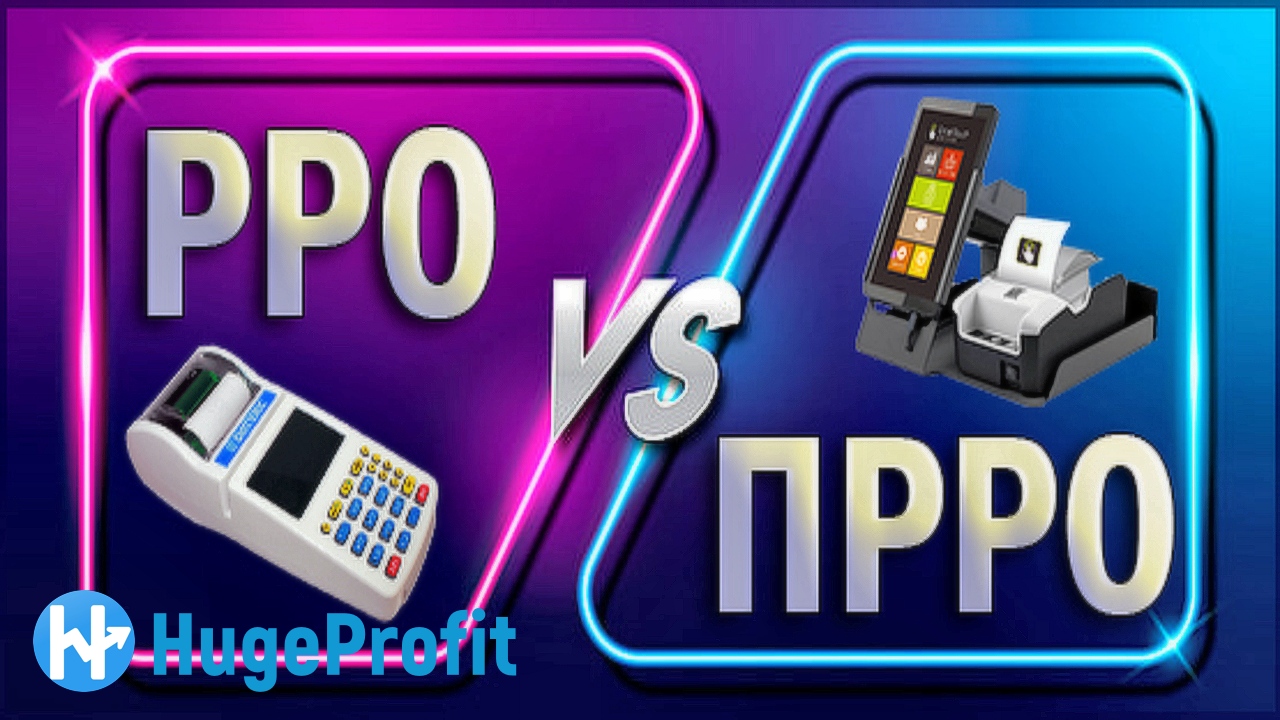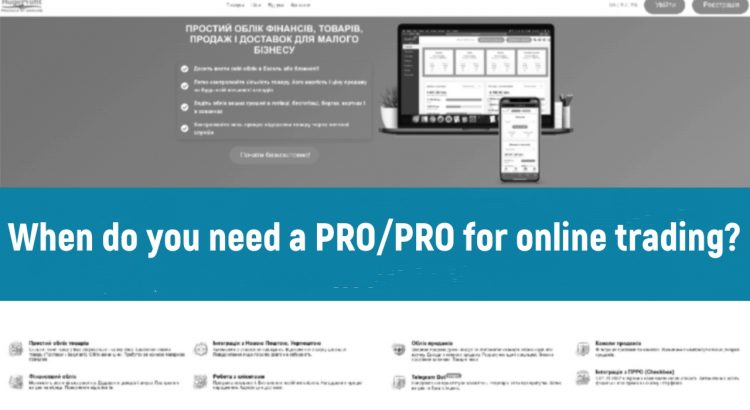Internet stores have become an integral part of modern commerce, serving as online platforms used by both individuals and legal entities to conduct their business activities.
It is important to note that the operation of internet stores requires the use of corresponding equipment, such as cash registers (RRO/PRRO). This is essential for accurate accounting and control of financial transactions, as well as compliance with legislation in the field of e-commerce.
The current legislation in Ukraine regarding e-commerce is constantly evolving, and we want to draw your attention to recent changes in 2023 related to the use of settlement transaction recorders (RRO). According to amendments to the RRO law (Law 129-IX) and the Tax Code, internet stores are required to strictly adhere to requirements related to the use of PRRO/RRO.

These requirements apply not only to legal entities but also to individuals engaged in commercial activities in the online sphere with an annual turnover exceeding UAH 1,320,000. The essence of these requirements lies in the necessity of issuing fiscal receipts at the time of selling a product.
Why is this requirement so important? The answer is simple—it is a measure to support fair competition and combat the shadow economy. Fiscal receipts serve as documentary evidence for each transaction, ensuring transparency and trust between the seller and the buyer. We understand that the implementation of RRO devices may pose certain difficulties and costs. However, it is an investment in the long-term well-being of your business.
The use of settlement transaction recorders (RRO/PRRO) becomes an integral part of the work for sellers of technically complex household appliances with warranty service. Regardless of the volume of trade turnover, these devices will become reliable assistants in organizing financial transactions and corresponding reporting.
It is important to note that PRRO and RRO are interchangeable, and the choice of a specific recorder depends on the characteristics of your business. However, regardless of the chosen device, the use of a settlement transaction recorder becomes a reliable guarantee of compliance with legislative requirements.
According to the law, the issuance of a fiscal receipt must be done on the day of placing an order. Even if the order was placed on weekends, the receipt should be issued on the first working day. This guarantees compliance with the rules and ensures transparency for both customers and businesses in the online trading sphere.
Issuing a receipt and having RRO/PRRO is an integral part of the legislation regulating settlement operations. These requirements were introduced to ensure transparency and control in financial transactions.
Failure to comply with the requirements for issuing a receipt and the presence of RRO/PRRO may entail various negative consequences. For example, entrepreneurs may be subject to fines or other legal consequences from regulatory authorities.
To comply with norms in the field of online trading, it is necessary to pay close attention to several important conditions:
- Payment methods: Conducting settlements in cash or using bank cards.
- Places of settlement: Clearly defining places where payments are made and where received funds are stored.
- Points of goods and services issuance: Establishing points where the buyer can receive paid goods or services.
The use of RRO/PRRO becomes mandatory for internet stores in several cases crucial for complying with the law and ensuring transparency of financial transactions.
- If the customer makes payment by bank card through the “Pay” function on your online store’s website, the use of RRO/PRRO becomes an integral part of the process.
- When payments are made using popular payment systems such as LiqPay from PrivatBank, Monobank, Portmone, and other services. In this case, the use of RRO/PRRO is necessary to confirm the payment and create a documentary trail for each transaction.
- If payment is made through Privat 24—one of the most popular online banking applications in Ukraine—where tax authorities scrutinize each transaction through PRRO. This ensures transparency and control over financial transactions and contributes to tax compliance.
Requirements for Formatting Fiscal Receipts for Stores:
- The first requirement for formatting a fiscal receipt for stores is to specify the receipt number. This allows for the unique identification of each sales transaction. The receipt number must be unique and sequentially increasing to avoid duplication or gaps.
- The second requirement involves specifying the fiscal registration number of the cash register (RRO/PRRO). This number serves to identify the specific device that performed the registration of the sales transaction. It also helps monitor the operation of cash equipment and prevent possible fraudulent actions.
- The third requirement is to indicate the date and exact time of receipt creation, including seconds. This is necessary to ensure the accuracy and reliability of sales data.
- The fourth requirement is related to the use of a bank terminal for sales transactions. When using a bank terminal, it is necessary to indicate the transaction identifier, which is a unique number for each operation.
Receipt for Online Payment of Goods
When paying for goods online, the seller is obligated to generate this receipt using RRO/PRRO (cash register of settlement operations/personal cash register of settlement operations) and provide it to the buyer along with the purchased item. The fiscal receipt is a document confirming the fact of payment and is necessary for transaction verification.

Receiving a fiscal receipt for online payment of goods is not only a mandatory legal requirement but also ensures transparency and reliability of the transaction for both the seller and the buyer. The buyer can be confident that their payment was made correctly and securely, while the seller has the opportunity to confirm the receipt of payment and provide the necessary documents for accounting purposes.
Receipt for Payment at Pickup Point
When paying at the pickup point, a fiscal receipt is generated and printed on the spot. Various payment methods are available: you can use a POS terminal or use cash. In any case, buyers are provided with a document confirming the purchase, which serves as the basis for exchange or return of the goods if necessary.
Receipt for Payment and Courier Delivery
Using a portable cash register for online stores with their own courier allows for cash payment directly from the customer, increasing convenience for the buyer and potentially boosting sales volume.
However, it is important to note that a portable cash register cannot be the sole RRO/PRRO in the store. In parallel with courier delivery, other cash points in the store can also operate. To ensure proper fiscalization of all operations and control over cash flows, additional fiscal registers need to be used.
Payment Using a Third-Party Courier Service
Payment using a third-party courier service, such as “Nova Poshta,” provides convenience and reliability for both stores and buyers. In this case, the store needs to provide the operator with a non-fiscal document, such as a waybill for the movement of goods. This document confirms the transfer of goods to the courier service and ensures transparency in the delivery process.
When the buyer pre-pays for the goods, the responsibility for RRO/PRRO lies with the seller, and the fiscal receipt should be placed in the packaging of the goods in advance.
Receipt for Cash-on-Delivery
Cash-on-delivery service through “Nova Poshta” and its “NovaPay” feature provides convenience and reliability for both sellers and buyers. However, it is important to note that even when using this service, the use of RRO or PRRO remains mandatory for fiscal accounting.
The receipt can be provided to the customer in various formats:
- A paper copy of the receipt can be included in the parcel with the goods upon delivery.
- The electronic form of the receipt is provided to the customer via email or messengers. This format is particularly relevant for online purchases or remote services where physical presence is not required. Customers can easily save electronic versions of receipts on their devices for future use or archiving.
It is important to understand that “Nova Poshta” and “NovaPay” do not play an active role in the transaction between the buyer and the seller. These postal services do not act as parties in the agreement between the merchant and the customer. The receipt provided by “Nova Poshta” for cash payment from the buyer is a document confirming the completion of the funds transfer operation but is not a settlement check issued by the seller.
Cases Where RRO or PRRO Usage May Not Be Necessary
- When paying for an order via the internet store’s bank account using IBAN details. This means that even with any chosen delivery method, you can bypass the use of these devices and free yourself from additional costs and temporary labor.
- When paying for goods through a self-service programmatic and technical complex (PТKС), such as the “green” terminals of PrivatBank, it is a convenient way to avoid using RRO/PRRO. However, it is essential to consider that if the payment is made through the Privat 24 system using a bank card, it will be considered as card payment and will require the application of RRO/PRRO. Therefore, if you aim to avoid this obligation, it is recommended to choose payment through PТKС for your convenience and time-saving.

Receipt for Purchase in Installments
Currently, more and more stores offer their customers the option of paying for a purchase in installments. This convenient solution allows spreading the cost of the product over several payments, making it accessible to a wide range of consumers.
However, when using this service, it is important to remember the rules established by the legislation. According to paragraph 2 of article 9 of the Law dated 06.07.1995 № 265/95-VR, in the absence of benefits for installment payment, the number of fiscal cash receipts must correspond to the number of payment installments and ultimately contain the total amount of the sales receipt.
To ensure transparency and legality of the transaction, providing a fiscal cash receipt can be done in various ways. This can include handing a paper version of the receipt directly to the buyer or sending an electronic version via email or a mobile application.
Usage of RRO/PRRO for Virtual Goods and Services Payment
Usage of RRO/PRRO can be excluded when selling virtual goods or services, but it is still necessary to provide the buyer with non-fiscal reporting documents. This approach ensures transparency and legality of the transaction for both the seller and the buyer.
Selling on Credit or with Deferred Payment
Offering the option to make a purchase on credit or with deferred payment is an important factor for many buyers. It allows them to spread the expenses for goods or services over a more extended period, which can be especially useful for significant purchases.
However, in accordance with legal requirements, online stores must provide their customers not only with a convenient payment form but also with appropriate documentation. This guarantees consumer rights protection and transparency of financial transactions.
The fiscal receipt, formatted according to the selected payment form (credit, cash-on-delivery, or deferred payment), is an integral part of this documentation. It contains information about the goods or services, cost, chosen payment form, and other necessary details. Handing over this receipt to the buyer after the purchase confirms the agreement and provides legal protection for both the online store and the buyer.
The funds received should be registered in the cash register using income cash orders. This allows for clear financial reporting and facilitates control over the movement of funds.
However, there is an alternative method of recording the received cash. The amount of cash received from the buyer, corresponding to the price of the goods or services indicated in the fiscal receipt with the annotation “credit/cash-on-delivery/deferred payment,” can be entered into the cash and settlement order (RRO) or portable cash and settlement machine (PRRO). These devices also provide the opportunity to store this information in the registrar’s memory.
Fines for Online Stores for Lack of Receipts (RRO/PRRO)
We draw your attention to an important aspect of your business activities that can impact your reputation and financial position. This concerns the need to comply with requirements related to the use of fiscal cash registers (RRO) or portable fiscal cash registers (PRRO), as well as issuing receipts to buyers.
According to regulatory acts, responsibility for violating these requirements regarding enterprises in the trade, service, and catering sectors is fully restored after the suspension associated with the onset of a state of war. It is important to note that this rule does not apply to temporarily uncontrolled or pre-frontline territories.
For online stores, this means that you are also subject to obligations regarding the installation and use of RRO or PRRO, as well as issuing receipts to buyers. Non-compliance with these requirements can lead to serious consequences, including fines and damage to your reputation.
We would like to draw your attention to the serious consequences of violations related to the use of RRO or PRRO.
- The first violation, such as settling for a partial amount or issuing a check with violations, may result in a fine of 100% of the product’s value.
- A repeated violation will have even more serious consequences. In this case, the fine will increase to 150% of the product’s value. This means that each new instance of non-compliance with the rules will have even more significant financial consequences.
From January 1, 2022, to September 30, 2023, inclusive, an amnesty for violations related to the use of RRO or PRRO was carried out. This means that you have a unique opportunity to correct errors and shortcomings that occurred during this period.
This amnesty applies to all entrepreneurs, except for certain economic entities such as excise trade, currency transactions, and gambling. If your business does not fall into these categories, you can take advantage of this opportunity to correct errors without any consequences.
If you are the owner of an online store and a single tax payer, and you are not subject to VAT and do not deal with excisable goods, currency transactions, gambling, or jewelry, the penalty rate for violations in the use of RRO or PRRO for your online store will be reduced.
According to current legislation, two penalty rates are provided for companies that commit violations.
- If the violation is recorded for the first time, the fine is 25% of the value of goods or services sold with violations. This gives the company an opportunity to correct its mistakes and take measures to prevent further violations.
- However, if the violation is repeated and concerns the use of a defective RRO/PRRO, the fine increases to 50% of the value of the goods.
